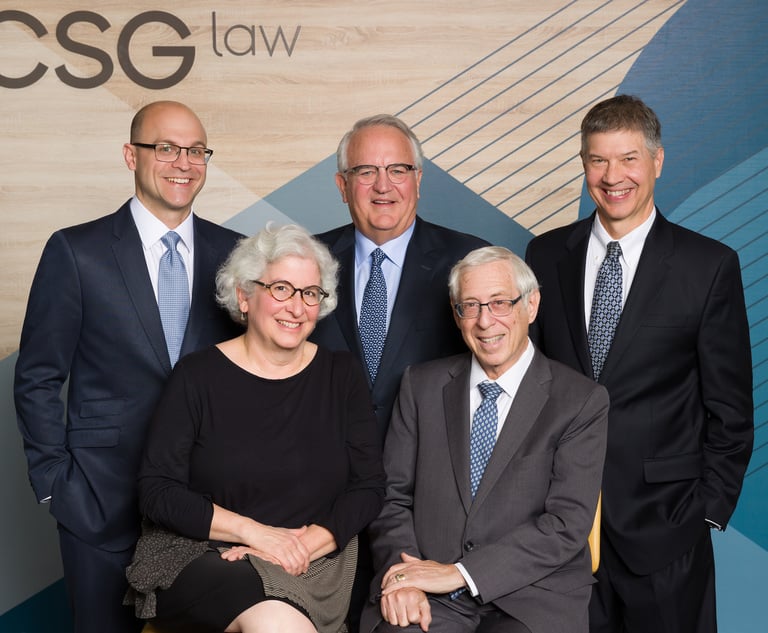In J&J's Backyard, Attorneys Paint Contrasting Pictures of Talc's Alleged Link to Mesothelioma
At opening statements Monday in a Middlesex County court for the second suit linking Johnson & Johnson's talc products to mesothelioma, the company offered several alternate theories for the source of the asbestos that caused the plaintiff's illness.
January 29, 2018 at 07:24 PM
4 minute read
 Photo Credit: Alexander Tolstykh/Shutterstock.com
Photo Credit: Alexander Tolstykh/Shutterstock.com
At opening statements Monday in a Middlesex County court for the second suit linking Johnson & Johnson's talc products to mesothelioma, the company offered several alternate theories for the source of the asbestos that caused the plaintiff's illness.
Stephen Lanzo III, 46, said in his suit that he was a lifelong user of Johnson's Baby Powder and was diagnosed with the deadly disease two years ago. His suit said the product is the only possible source of the asbestos that caused his illness. While mesothelioma is often associated with shipyard workers or other industrial jobs, Lanzo is a nonsmoker who never worked in an occupation that could expose him to asbestos.
But counsel for Johnson & Johnson told jurors that the home in Montclair where Lanzo grew up received an abatement in 2002 for basement pipes wrapped in asbestos, and the plaintiff's brother testified that he would swing from those pipes as a youngster, which might have dislodged some of the fibers. What's more, the elementary, middle and high schools Lanzo attended in Montclair all have undergone multiple rounds of asbestos abatement, said Robert Brock of Kirkland & Ellis in Washington, who represents Johnson & Johnson. In addition, Lanzo has lived most of his life in northern New Jersey, except for a period where he lived in Northern California, and both those places have a high rate of natural exposure to asbestos, said Brock.
“There are ample opportunities for exposure to occur for Mr. Lanzo or for anyone living in those areas,” Brock said.
The seven women and two men on the jury will be called upon to wade through voluminous scientific testimony. Johnson & Johnson maintains that the company's talc products have never contained asbestos, while the plaintiff's counsel argues that the talc mine in Vermont that was a longtime source of the company's Johnson's Baby Powder was known to contain asbestos since the early 1970s.
Lanzo's lawyer, Moshe Maimon of Levy Konigsberg in New York, said that when Johnson & Johnson learned its talc contained asbestos, it tried unsuccessfully to remove it from their powder. The company also considered making its baby powder from corn starch, but decided not to, he said. They could have placed a warning label on its products containing asbestos, but failed to do so, he said. Instead, they decided to inform the public that the asbestos in talc was something else, he said.
“The evidence will be that J&J had better choices. They could have informed the public of what they knew and left the choice to individuals,” said Maimon.
J&J's Brock said Lanzo needed to prove that the company's talc contained substantial asbestos, that Lanzo was exposed to that asbestos and that asbestos from the talc caused Lanzo's illness. “The plaintiffs will not meet his proofs on those issues, Brock said.
Maimon appeared to be concerned that the trial venue of New Brunswick is also the headquarters of Johnson & Johnson, which is an important part of the region's economy. He said it was important to acknowledge “what this case is not about. It's not about baby shampoo. It's not about band aids. It's not about Tylenol. It's not about Robert Wood Johnson Hospital. It's not about the many fine people that work at J&J. It's about the actions and decisions of a small group of people at J&J and what they did.”
Brock followed that with a brief history of the company, which was founded in 1886, then added, “It's just beyond believable that the good people at J&J would ever sell a product that contained asbestos,” he said.
Johnson & Johnson already has one victory under its belt in litigation linking the company's talc products to mesothelioma. The first case, brought by plaintiff Tina Herford, ended in a defense verdict in November 2017 in Los Angeles Superior Court. The company has also seen more than 5,000 suits by women who claimed they developed ovarian cancer from using J&J talc products for feminine hygiene.
In 2016, plaintiffs obtained three verdicts against the company—$55 million, $70 million and $72 million—in suits linking talc to ovarian cancer. In 2017, J&J saw one defense verdict in talc litigation, and two verdicts for plaintiffs—$110 million and $417 million. Two of the ovarian cancer verdicts, for $72 million and $417 million, have been reversed.
This content has been archived. It is available through our partners, LexisNexis® and Bloomberg Law.
To view this content, please continue to their sites.
Not a Lexis Subscriber?
Subscribe Now
Not a Bloomberg Law Subscriber?
Subscribe Now
NOT FOR REPRINT
© 2024 ALM Global, LLC, All Rights Reserved. Request academic re-use from www.copyright.com. All other uses, submit a request to [email protected]. For more information visit Asset & Logo Licensing.
You Might Like
View All
Hit by Mail Truck: Man Agrees to $1.85M Settlement for Spinal Injuries

Appellate Div. Follows Fed Reasoning on Recusal for Legislator-Turned-Judge
4 minute read
Chiesa Shahinian Bolsters Corporate Practice With 5 From Newark Boutique
5 minute read
On the Move and After Hours: Brach Eichler; Cooper Levenson; Marshall Dennehey; Archer; Sills Cummis
7 minute readTrending Stories
- 1Republican FTC Commissioner: 'The Time for Rulemaking by the Biden-Harris FTC is Over'
- 2NY Appellate Panel Cites Student's Disciplinary History While Sending Negligence Claim Against School District to Trial
- 3A Meta DIG and Its Nvidia Implications
- 4Deception or Coercion? California Supreme Court Grants Review in Jailhouse Confession Case
- 5State Bar of Georgia Presents Access to Justice Pro Bono Awards
Who Got The Work
Michael G. Bongiorno, Andrew Scott Dulberg and Elizabeth E. Driscoll from Wilmer Cutler Pickering Hale and Dorr have stepped in to represent Symbotic Inc., an A.I.-enabled technology platform that focuses on increasing supply chain efficiency, and other defendants in a pending shareholder derivative lawsuit. The case, filed Oct. 2 in Massachusetts District Court by the Brown Law Firm on behalf of Stephen Austen, accuses certain officers and directors of misleading investors in regard to Symbotic's potential for margin growth by failing to disclose that the company was not equipped to timely deploy its systems or manage expenses through project delays. The case, assigned to U.S. District Judge Nathaniel M. Gorton, is 1:24-cv-12522, Austen v. Cohen et al.
Who Got The Work
Edmund Polubinski and Marie Killmond of Davis Polk & Wardwell have entered appearances for data platform software development company MongoDB and other defendants in a pending shareholder derivative lawsuit. The action, filed Oct. 7 in New York Southern District Court by the Brown Law Firm, accuses the company's directors and/or officers of falsely expressing confidence in the company’s restructuring of its sales incentive plan and downplaying the severity of decreases in its upfront commitments. The case is 1:24-cv-07594, Roy v. Ittycheria et al.
Who Got The Work
Amy O. Bruchs and Kurt F. Ellison of Michael Best & Friedrich have entered appearances for Epic Systems Corp. in a pending employment discrimination lawsuit. The suit was filed Sept. 7 in Wisconsin Western District Court by Levine Eisberner LLC and Siri & Glimstad on behalf of a project manager who claims that he was wrongfully terminated after applying for a religious exemption to the defendant's COVID-19 vaccine mandate. The case, assigned to U.S. Magistrate Judge Anita Marie Boor, is 3:24-cv-00630, Secker, Nathan v. Epic Systems Corporation.
Who Got The Work
David X. Sullivan, Thomas J. Finn and Gregory A. Hall from McCarter & English have entered appearances for Sunrun Installation Services in a pending civil rights lawsuit. The complaint was filed Sept. 4 in Connecticut District Court by attorney Robert M. Berke on behalf of former employee George Edward Steins, who was arrested and charged with employing an unregistered home improvement salesperson. The complaint alleges that had Sunrun informed the Connecticut Department of Consumer Protection that the plaintiff's employment had ended in 2017 and that he no longer held Sunrun's home improvement contractor license, he would not have been hit with charges, which were dismissed in May 2024. The case, assigned to U.S. District Judge Jeffrey A. Meyer, is 3:24-cv-01423, Steins v. Sunrun, Inc. et al.
Who Got The Work
Greenberg Traurig shareholder Joshua L. Raskin has entered an appearance for boohoo.com UK Ltd. in a pending patent infringement lawsuit. The suit, filed Sept. 3 in Texas Eastern District Court by Rozier Hardt McDonough on behalf of Alto Dynamics, asserts five patents related to an online shopping platform. The case, assigned to U.S. District Judge Rodney Gilstrap, is 2:24-cv-00719, Alto Dynamics, LLC v. boohoo.com UK Limited.
Featured Firms
Law Offices of Gary Martin Hays & Associates, P.C.
(470) 294-1674
Law Offices of Mark E. Salomone
(857) 444-6468
Smith & Hassler
(713) 739-1250






